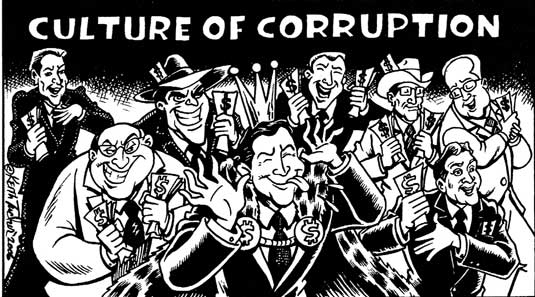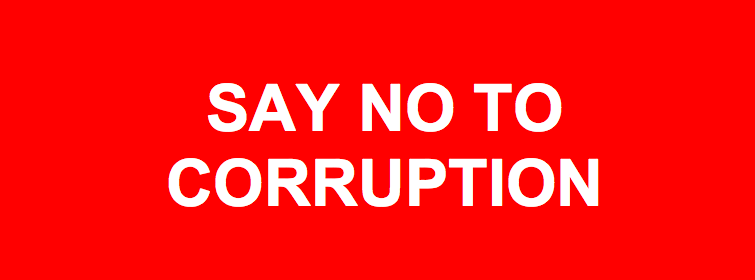
Corruption, Corruption,... Corruption, Everywhere
Photo: wordpress.com
Corruption-Fifa, Football, Sports
Corruption- Global Banks
Corruption- Global Pharmaceuticals, Healthcare, Doctors and surgeons
Corruption- Military Industrial Complex, Arms Sales
Corruption- Global Tobacco and Alcohol, Gambling and Casinos
Corruption- Retail sector, Supermarkets
Corruption- Politics, Economics, Business, Government, Parliament
Corruption- Energy, Oil, Gas,…
Corruption- Media
Corruption- Religions
Corruption- Education
Corruption- Individuals
Corruption- National and International Institutions
Corruption, Corruption,…Corruption, Everywhere
As it has been noted, “Corruption is a common and pervasive human flaw. In every society, there are people who will act improperly if they think that they won’t get caught. Nations enact laws to try to curb corrupt activities, but the lure of money - and power, in some circumstances - is irresistible to many. If there is money, if there is power, there is the likelihood of corruption - whether blatant, or hidden, whether in government, in private business or among individuals.”
Every year on December 9 we mark International Anti-Corruption Day. Started a decade ago by the U.N.’s General Assembly, which states on its website that “corruption is a complex social, political and economic phenomenon that affects all countries … [it] undermines democratic institutions, slows economic development and contributes to governmental instability … [it] attacks the foundation of democratic institutions.”
This all sounds good — except for the first part, that the issue is “complex”. This gives the impression that we should not blame anybody for the time that it takes to reduce or eradicate corruption. What do you expect? ... It is a complex issue!
This, I am not prepared to accept. It is not a complex issue to tackle corruption, if there is a will to do so. And the key that will unlock the door to a corrupt-free world is EDUCATION, as simple as that. Let me explain.
As

Photo: wordpress.com
I am sure you will agree with me that education is the foundation for a good and fulfilling life, setting the individual on a path of personal fulfilment, economic security and societal contribution. The path to a better world is through education - not any education, and surely not the education mostly on offer currently, but a truly different form of education, an education grounded in values and delivered by those who know that it is a great honour and responsibility to be a teacher, as well as knowing that teaching, above all else, is a vocation and learning is a sacrament.
In this time of spiritual confusion, when the world of knowledge and competence is in a constant state of flux, it is vitally important to demonstrate that education has to be principle-based and can do more than stumble in the dark: it needs to point students to the light of the world, by engaging them with life’s bigger questions.
In today’s money-driven and short-sighted world, we have got it all wrong! What it is meant by education? We are confusing the so-called education on offer with wisdom and knowledge, where in fact it is nothing of the sort.
If education is values-led, if education is about ethics, morality, spirituality, love and humanity, and not only about making money, then, for sure, we will be able to tackle the reasons for so much corruption and wrong doing.
What kind of education is this when at prestigious universities one can see no correlation between economics, business and ethics, for example?
This can be seen best when reading a letter that Lord Kalms had written to the Times on 8 March 2011:
Ethics boys
Sir, Around 1991 I offered the LondonSchool of Economics a grant of £1 million to set up a Chair in Business Ethics. John Ashworth, at that time the Director of the LSE, encouraged the idea but had to write to me to say, regretfully, that the faculty had rejected the offer as it saw no correlation between ethics and economics. Quite. Lord Kalms, House of Lords
By now it must be clear that, given the state of our world today - a world of progress and poverty - the continuing and deepening global turmoil and crises merely is a symptom of a much larger moral, spiritual and ethical crisis. In short, the world is facing a crisis of values; a crisis of trust and this brings me back to my original point: Values-led Education to build a better world.
What might that education be like, you may ask?
Today, our global family is facing a multitude of enduring and potentially catastrophic crises. For me, the answers lie in simplicity. There is no need to complicate matters further. After all, in the wise words of Leonardo da Vinci, “Simplicity is the ultimate sophistication.”
In the wise and eloquent words Lao Tzu, a mystic philosopher of ancient China, considered the founder of Taoism:
Some say that my teaching is nonsense.
Others call it lofty but impractical.
But to those who have looked inside themselves,
this nonsense makes perfect sense.
And to those who put it into practice,
this loftiness has roots that go deep.
I have just three things to teach:
simplicity, patience, compassion.
These three are your greatest treasures.
Simple in actions and in thoughts,
you return to the source of being.
Patient with both friends and enemies,
you accord with the way things are.
Compassionate toward yourself,
You reconcile all beings in the world.
And finally, you may ask, as well as simplicity in education, what other values we may need to enable us to build, if not a totally corrupt-free, but at least a much less corrupt world?
To answer this excellent question I can do no better than to offer the values of the GCGI, which we hold very dearly:

Photo: sorendreier.com
We value caring and kindness
We value passion and positive energy
We value service and volunteerism
We value simplicity and humility
We value trust, openness, and transparency
We value values-led education
We value harmony with nature
We value non-violent conflict resolution
We value interfaith, inter-civilisational and inter-generational dialogue
We value teamwork and collaboration
We value challenge and excellence
We value fun and play
We value curiosity and innovation
We value health and wellbeing
We value a sense of adventure
We value people, communities and cultures
We value friendship, cooperation and responsibility
To reflect more fully on the points raised in this Blog, I very much recommend you to read the text of a lecture I gave at London School of Economics on Wednesday 20 May, 2015. The lecture was at the invitation of the World Congress of Faiths:
Economics, Globalisation and the Common Good: A Lecture at London School of Economics
